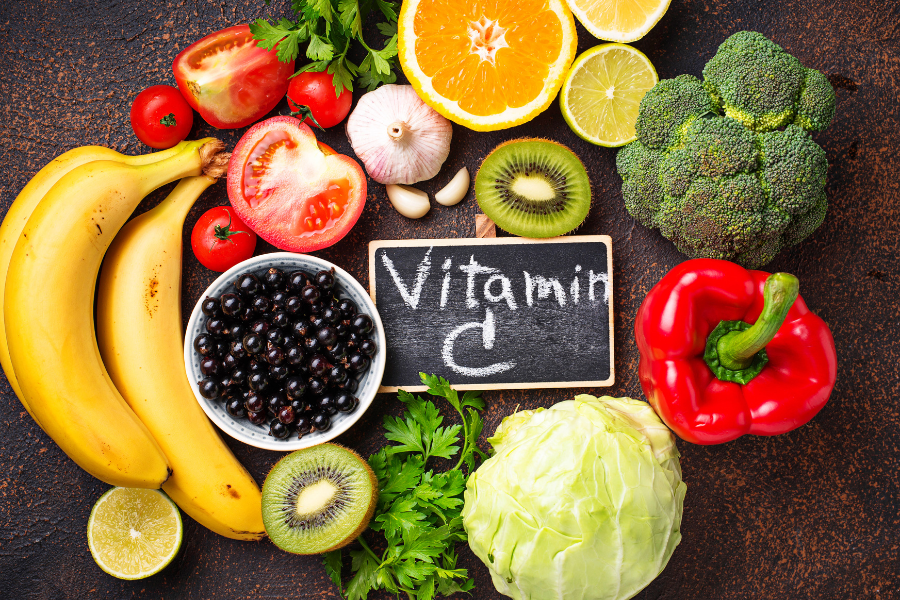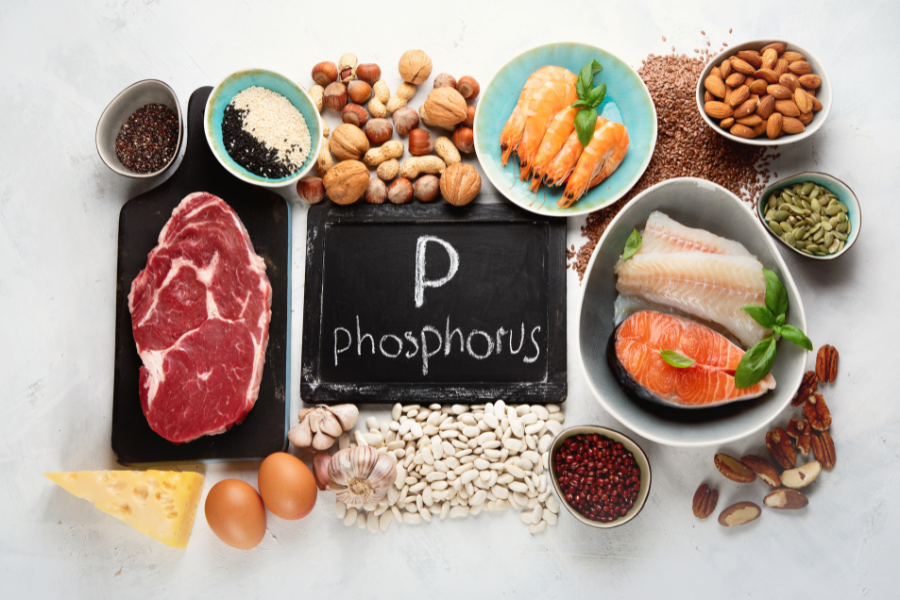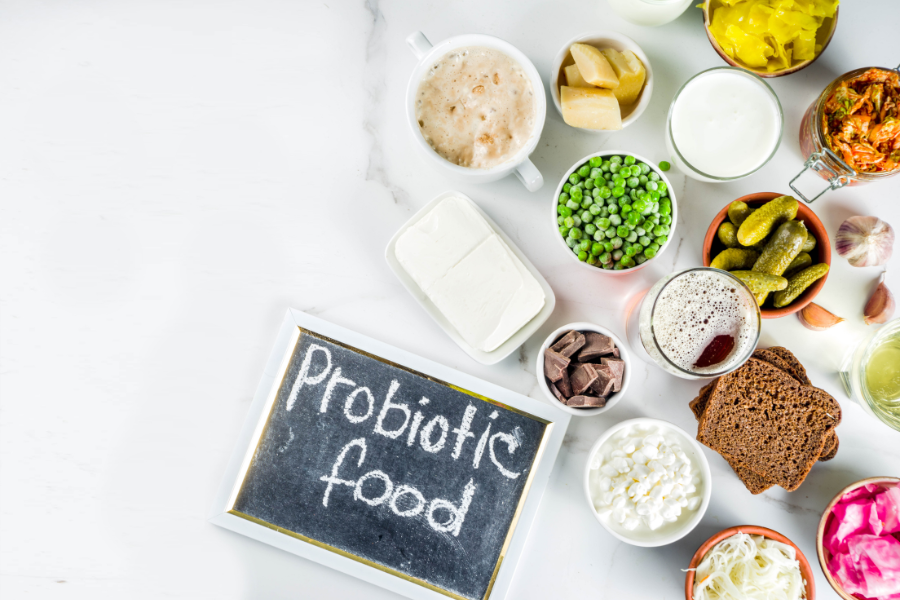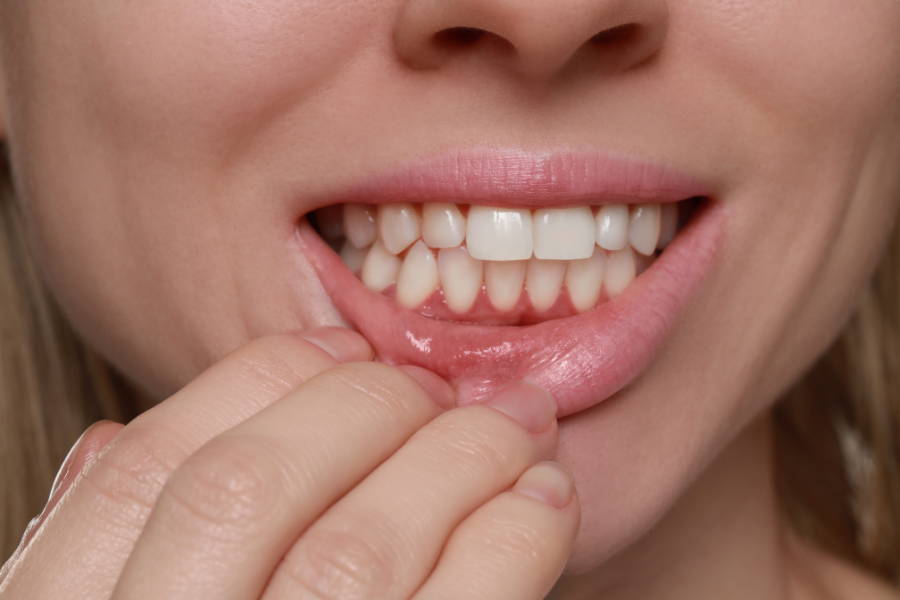Taking care of your oral health, and especially the health of your gums, has never been so within your reach.
You will be shocked how some well-known vitamins, minerals, and other elements can become the key to the health of your gums!
A deficiency of certain nutrients can cause many periodontal diseases, such as gingivitis. More vitamins and minerals for a healthy diet could be the secret to a strong and healthy mouth.
You will discover these vitamins, minerals, and other elements in this article. And if they are not already part of your daily life, they can easily be introduced into your diet and improve the health of your gums. Find out more below.
Contents
- 1 1. Vitamin A
- 2 2. B complex vitamins
- 3 3. Vitamin C
- 4 4. Vitamin D
- 5 5. Vitamin K
- 6 Main minerals to maintain gum health
- 7 Supplements and complements to achieve healthy gums
- 8 How vital are vitamins in maintaining good oral health, especially gum health?
- 9 FAQ
- 9.1 1. Which vitamins are effective for treating receding gums?
- 9.2 2. How can vitamins help reduce bleeding gums?
- 9.3 3. Which natural supplement is recommended for gum disease?
- 9.4 4. How can I make my gums healthy again?
- 9.5 5. Which B vitamin is best for gum health?
- 9.6 6. Which vitamin deficiency can cause gum problems?
1. Vitamin A
It is responsible for tooth formation and saliva production. A diet low in Vitamin A, especially in childhood, can cause hypoplasia, which is poor formation of tooth enamel. Teeth are exposed and vulnerable.
The fight against infections and inflammation is done by white blood cells produced by Vitamin A. If gum inflammation, dry mouth, or loose teeth are a problem for you, this vitamin is a powerful ally to keep your gums healthy.
Where to find it: Orange vegetables and fruits, such as carrots and pumpkin. For example, you can also obtain this vitamin from beef liver, oily fish, and egg yolks.
2. B complex vitamins
B Complex Vitamins are incredible and can help you get rid of bad breath, bleeding gums, and dryness, repair mouth tissues, and help with gum irritation and healing. They can even help prevent mouth cancer.
Vitamin B1 helps with oral health because its enzymes break down fats, carbohydrates, and proteins present in you. Vitamin B3 is the secret to getting rid of bad breath.
Vitamin B7, or Biotin, is responsible for producing keratin and collagen. Collagen helps to make your teeth, gums, the soft parts, and those that support your teeth extremely strong and healthy.
Vitamin B12 helps with healing and the production of the lining of the mouth for healthier gums. And let’s not forget folic acid is essential in repairing mouth tissues and capable of preventing mouth cancer.
Where to find it: In oat bran, vegetables, red meat, fish, and some dairy products, you can also find B Complex Vitamins.
3. Vitamin C

One of the best-known antioxidants. Vitamin C is also responsible for strengthening your immune system and collagen production.
If you suffer from inflamed gums and recurring bleeding, it may indicate you are deficient in Vitamin C.
Where I find it: A great source of Vitamin C is dark vegetables like broccoli, spinach, and kale. It can also be found in peppers, tomatoes, and strawberries. Another known source is citrus fruits such as orange, lemon, grapefruit, and kiwi.
4. Vitamin D
Vitamin D is one of the most important nutrients in strengthening your immune system, antibacterial, and also in the musculoskeletal system, having an important role to play in the structure of our bones and teeth. It also helps produce minerals that are important for strengthening tooth enamel.
Problems such as retraction, inflammation and bleeding gums, cavities, burning, and the sensation of a metallic taste in the mouth are related to a lack of Vitamin D in your body.
As it helps to strengthen the structure of the teeth, it is highly recommended by dentists in dental implant and reimplantation treatments. Especially in older people, it becomes increasingly difficult for our bodies to absorb this vitamin as we age.
Where do I find it: The best source of Vitamin D is the sun. A few minutes of sunlight a day, especially in the morning, is enough for a good absorption of Vitamin D. It is still possible to find Vitamin D in some breakfast cereals, red meat, oily fish, and egg yolks.
5. Vitamin K
Little talked about, it plays a vital role in combating gum irritation and inflammation, even preventing gum bleeding because it has antioxidant and anti-inflammatory properties.
Vitamin K produces osteocalcin proteins, which are responsible for keeping our teeth and bones strong.
Where to find it: The main sources of Vitamin K are olive oil, beef liver, carrots, and some healthier cheeses. However, it can also be found in green vegetables such as spinach and kale.
Main minerals to maintain gum health
6. Calcium
Calcium is one of the most important minerals for the health of our teeth and for strengthening tooth enamel. Therefore, it is a strong ally against cavities.
Where to find it: Dairy products, in general, are one of the main sources of calcium for those with lactose intolerance problems, as are tofu, fish such as salmon and sardines, and dark leafy vegetables.
7. Phosphor

In addition to calcium, phosphorus is another essential mineral in tooth formation, as well as in the bones of our body. Ingesting the necessary amount of phosphorus is synonymous with healthy teeth. And, consequently, a healthy mouth in general.
Where can I find it: Red meat is rich in phosphorus. Eggs, dairy products, and seafood in general. Some oil-based foods such as chestnuts, almonds, and walnuts are also great options.
8. Iron
Another mineral that can be a powerful ally in maintaining your oral health is iron.
He is the one who will help you keep your teeth strong and beautiful and prevent possible mouth wounds and inflammation.
Where can I find it: It is present in whole grains, chicken, and beans.
9. Zinc
Zinc and its anti-inflammatory properties help maintain healthy gums, free from inflammation.
It can also help fight bacterial plaque.
Where can I find it: Red meat, chicken, seafood, dairy products and egg yolks.
Supplements and complements to achieve healthy gums
10. Omega-3
Essential fatty acids EPA and DHA, or Omega-3, can help prevent bad bacteria. In addition, it is an excellent anti-inflammatory.
Thus, with it, you can protect your gums against inflammation and bleeding.
Where to find it: Fish oil is a super concentrated source of Omega-3, but you can also get Omega-3 by eating fish like salmon, tuna, and sardines. Flaxseed and chia are also sources of Omega-3.
11. Probiotics

You would think that probiotics are only good for your gut health, but no!
The function of probiotics is to control the proliferation of harmful bacteria in our body by ingesting good bacteria. For this reason, it is an excellent choice when considering your oral health.
It is a powerful antibacterial, but it’s also great as an anti-inflammatory and will leave your gums healthier than ever.
Where do I find it: Dairy products in general, especially yogurts and fermented milk.
12. Melatonin
A curious supplement is melatonin. It is a hormone responsible for the quality of our sleep and immune system.
It also has antioxidant enzymes. It is anti-inflammatory and helps reduce gum swelling.
Where to find it: Unfortunately, melatonin cannot be found in foods like the other vitamins, minerals, and other supplements on this list. Our body produces this hormone naturally, but if you suspect you have low hormone production, you can obtain melatonin in a synthesized form in supplements, including natural ones.
13. CoQ10
Coenzyme CoQ10 is another antioxidant produced by our body. Like most antioxidants, it is also a potent anti-inflammatory.
Where to find it: In cereals, grains, oilseed foods, dark leafy vegetables such as broccoli and spinach, and some fruits such as strawberries, avocados, and oranges.
14. Curcumin
You may not know it, but curcumin is found in a spice known as turmeric. Turmeric has a peculiar and spicy flavor that leaves food with a yellowish hue.
It is a powerful antibacterial. It also has anti-inflammatory and antioxidant properties.
It can reduce the production of the bacteria that cause gum inflammation and bleeding, leaving your gums healthier.
15. Green tea
Green tea is another food with antioxidant properties, making it a great complement to your oral health, especially the health of your gums.
A great thing about green tea is that it is full of vitamins and minerals, which we discuss in today’s article. It is rich in Vitamin C and some B Complex Vitamins such as Vitamin B1, B2 and folic acid.
Use and abuse this drink to keep your mouth and gums healthy.
How vital are vitamins in maintaining good oral health, especially gum health?

Vitamins and minerals are essential for gum health due to their anti-inflammatory properties. Great for preventing and curing gingivitis, a very common periodontal disease.
Gingivitis is nothing more than inflammation of the soft tissue that is the gums, causing sensitivity and bleeding. Increasing your diet with vitamins and minerals is a powerful ally in maintaining a healthy mouth and smile.
Enhance your healthy diet by reducing sugar! And be sure to brush your teeth twice daily, always use dental floss, and finish your oral hygiene ritual with mouthwash. Remember to schedule your dentist visits twice a year, too.
It is important to make it clear that nobody behaves the same way. Sometimes, even if you already have a diet rich in the vitamins we discussed today, your body cannot absorb the amount necessary to make a difference in your oral health. Vitamin supplements will be able to help you with this.
Now add these vitamins, minerals, and other elements to your diet! Improve your oral health, especially the health of your gums. Make your teeth strong and healthy!
(In more severe or advanced cases of gum disease, we recommend that you seek out a professional in the area so that they can analyze and recommend the most appropriate treatment.)
FAQ
1. Which vitamins are effective for treating receding gums?
Vitamin D is the most recommended for treating gum recession. It helps strengthen the immune, antibacterial, and musculoskeletal systems. It also helps with inflammation and bleeding gums cavities. In addition to sunbathing, you can also find Vitamin D in foods such as breakfast cereals, red meat, oily fish, and egg yolks.
2. How can vitamins help reduce bleeding gums?
Most vitamins have anti-inflammatory properties, combining inflamed and bleeding gums in slightly more advanced cases.
3. Which natural supplement is recommended for gum disease?
Probiotics are highly recommended for treating gum disease. That is because they can control the proliferation of bacteria harmful to oral health through the benign bacteria ingested with these supplements.
Its antibacterial and anti-inflammatory action is a powerful ally in treating gum disease.
4. How can I make my gums healthy again?
Good oral hygiene with daily tooth brushing, dental floss, mouthwash, and a healthy diet rich in vitamins, minerals, and other supplements are essential for good oral health. Reduce sugar, and be sure to visit your dentist for the health of your gums and mouth.
5. Which B vitamin is best for gum health?
Vitamin B12 and folic acid are the best B Complex Vitamins for restoring gum health. They help with healing and the production of the lining of the mouth, repair oral tissues, and can also prevent mouth cancer.
6. Which vitamin deficiency can cause gum problems?
Vitamins A, C, D, and K deficiency are directly associated with the most common gum problems, such as inflammation, bleeding, and swelling of the gums. A diet rich in these vitamins can regenerate your gum’s health and, therefore, your oral health.
